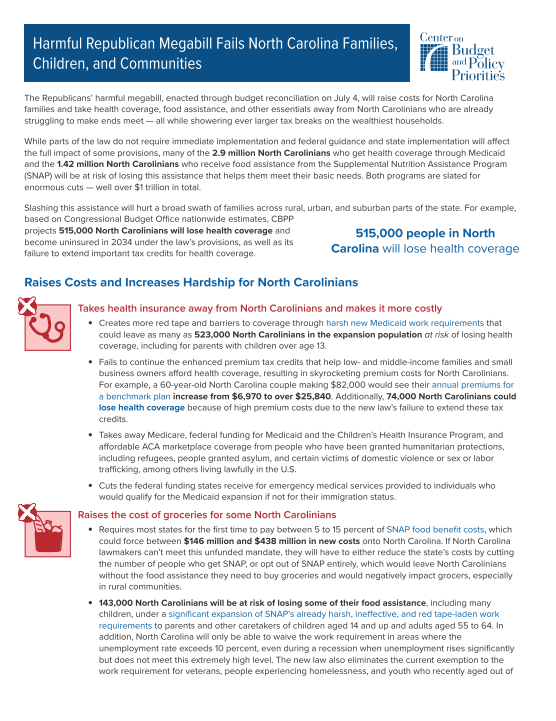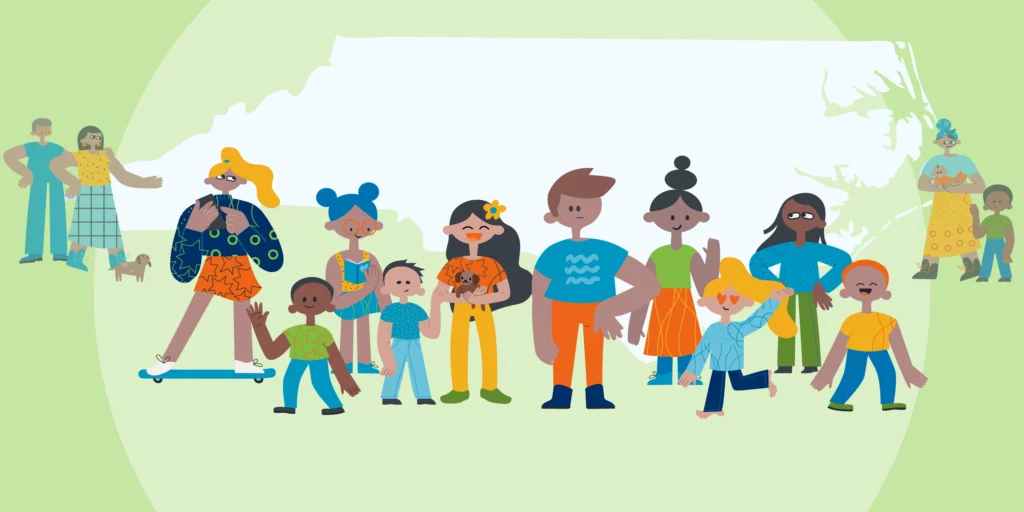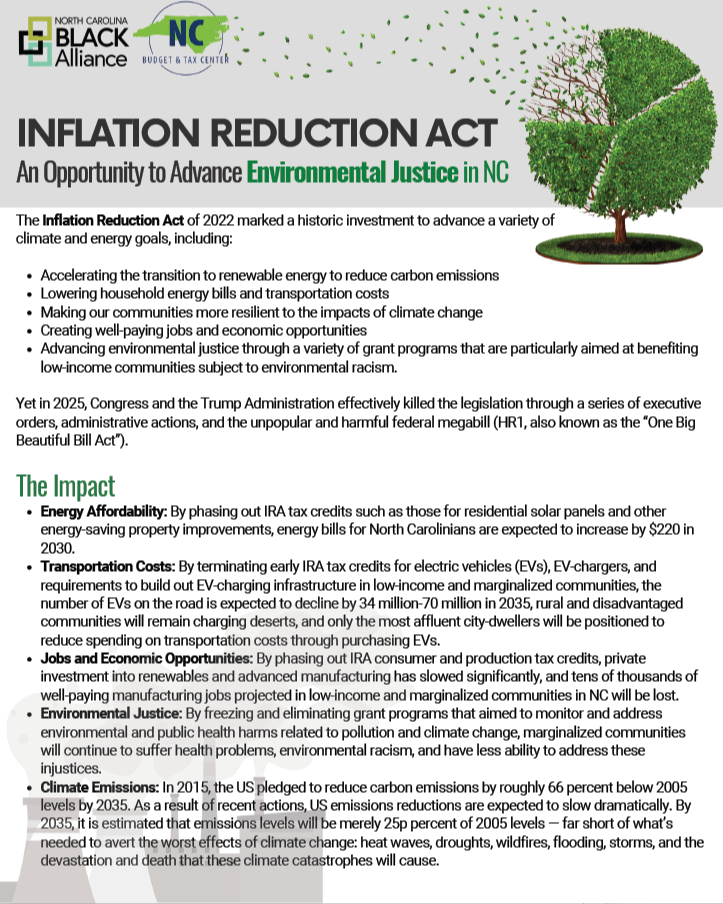Fact Sheet: Harmful Republican Megabill Fails North Carolina Families, Children, and Communities

The Republicans’ harmful megabill, enacted through budget reconciliation on July 4, will raise costs for North Carolina families and take health coverage, food assistance, and other essentials away from North Carolinians who are already struggling to make ends meet — all while showering ever larger tax breaks on the wealthiest households.
While parts of the law do not require immediate implementation and federal guidance and state implementation will affect the full impact of some provisions, many of the 2.9 million North Carolinians who get health coverage through Medicaid and the 1.42 million North Carolinians who receive food assistance from the Supplemental Nutrition Assistance Program (SNAP) will be at risk of losing this assistance that helps them meet their basic needs. Both programs are slated for enormous cuts — well over $1 trillion in total.
Slashing this assistance will hurt a broad swath of families across rural, urban, and suburban parts of the state. For example, based on Congressional Budget Office nationwide estimates, CBPP projects 515,000 North Carolinians will lose health coverage and become uninsured in 2034 under the law’s provisions, as well as its failure to extend important tax credits for health coverage.
Raises Costs and Increases Hardship for North Carolinians
Takes health insurance away from North Carolinians and makes it more costly
- Creates more red tape and barriers to coverage through harsh new Medicaid work requirements that could leave as many as 523,000 North Carolinians in the expansion population at risk of losing health coverage, including for parents with children over age 13.
- Fails to continue the enhanced premium tax credits that help low- and middle-income families and small business owners afford health coverage, resulting in skyrocketing premium costs for North Carolinians. For example, a 60-year-old North Carolina couple making $82,000 would see their annual premiums for a benchmark plan increase from $6,970 to over $25,840. Additionally, 74,000 North Carolinians could lose health coverage because of high premium costs due to the new law’s failure to extend these tax credits.
- Takes away Medicare, federal funding for Medicaid and the Children’s Health Insurance Program, and affordable ACA marketplace coverage from people who have been granted humanitarian protections, including refugees, people granted asylum, and certain victims of domestic violence or sex or labor trafficking, among others living lawfully in the U.S.
- Cuts the federal funding states receive for emergency medical services provided to individuals who would qualify for the Medicaid expansion if not for their immigration status.
Raises the cost of groceries for some North Carolinians
- Requires most states for the first time to pay between 5 to 15 percent of SNAP food benefit costs, which could force between $146 million and $438 million in new costs onto North Carolina. If North Carolina lawmakers can’t meet this unfunded mandate, they will have to either reduce the state’s costs by cutting the number of people who get SNAP, or opt out of SNAP entirely, which would leave North Carolinians without the food assistance they need to buy groceries and would negatively impact grocers, especially in rural communities.
- 143,000 North Carolinians will be at risk of losing some of their food assistance, including many children, under a significant expansion of SNAP’s already harsh, ineffective, and red tape-laden work requirements to parents and other caretakers of children aged 14 and up and adults aged 55 to 64. In addition, North Carolina will only be able to waive the work requirement in areas where the unemployment rate exceeds 10 percent, even during a recession when unemployment rises significantly but does not meet this extremely high level. The new law also eliminates the current exemption to the work requirement for veterans, people experiencing homelessness, and youth who recently aged out of foster care. (The new law does provide some protections for certain people who are American Indians or Alaska Natives.)
- Takes away food assistance from people who have been granted humanitarian protections, including refugees, people granted asylum, and certain victims of domestic violence or sex or labor trafficking, among others living lawfully in the U.S. In 2023, roughly 8,000 North Carolinians participated in SNAP who were admitted as refugees, granted asylum, or granted withholding of removal.
Passes the buck to North Carolina lawmakers
- This extreme legislation makes enormous cuts to food assistance and health care in part by shifting substantial new costs onto state governments. This includes requiring states to absorb a portion of SNAP benefit costs for the first time ever, cutting federal funding for state administrative costs in SNAP, implementing new forms of red tape that will increase uncompensated care costs, and restricting how states can fund their Medicaid programs, including through provider taxes. These higher costs will be hard for North Carolina to shoulder even when times are good, let alone when finances are strained.
Increases energy prices while cutting jobs
- To partially offset its roughly $4.5 trillion in regressive tax cuts, the new law includes $480 billion in cuts to clean energy tax credits, which will raise the cost of installing wind and solar, the lowest-cost energy. These cuts could cause two-thirds of planned projects nationwide to be canceled and could lead to annual household energy prices increasing by roughly $700 and 42,000 jobs lost in North Carolina in 2035.
Delivers Massive Tax Cuts to the Wealthiest North Carolinians While Failing to Deliver Support to Working Families and Children
Gives more tax cuts to the wealthy
- In 2026, this tax plan gives the richest 1 percent of North Carolinians, earning more than $867,100 a year, an annual tax cut of $61,150. In contrast, the lowest-income North Carolinians, earning less than $24,900, will see a net increase in their taxes by an average of $70, while also bearing the brunt of deep cuts to Medicaid and SNAP and facing higher prices due to the President’s tariffs.
Leaves children in lower-income working families behind
- As many as 601,000 children in North Carolina will get nothing from the $200-per-child increase in the Child Tax Credit because their parents — who often work important but low-paid jobs — don’t earn enough.
- Takes away eligibility for the Child Tax Credit from U.S. citizen children and those with lawful status with a requirement that at least one parent have a Social Security number, which affects roughly 87,000 children in North Carolina by one estimate.



